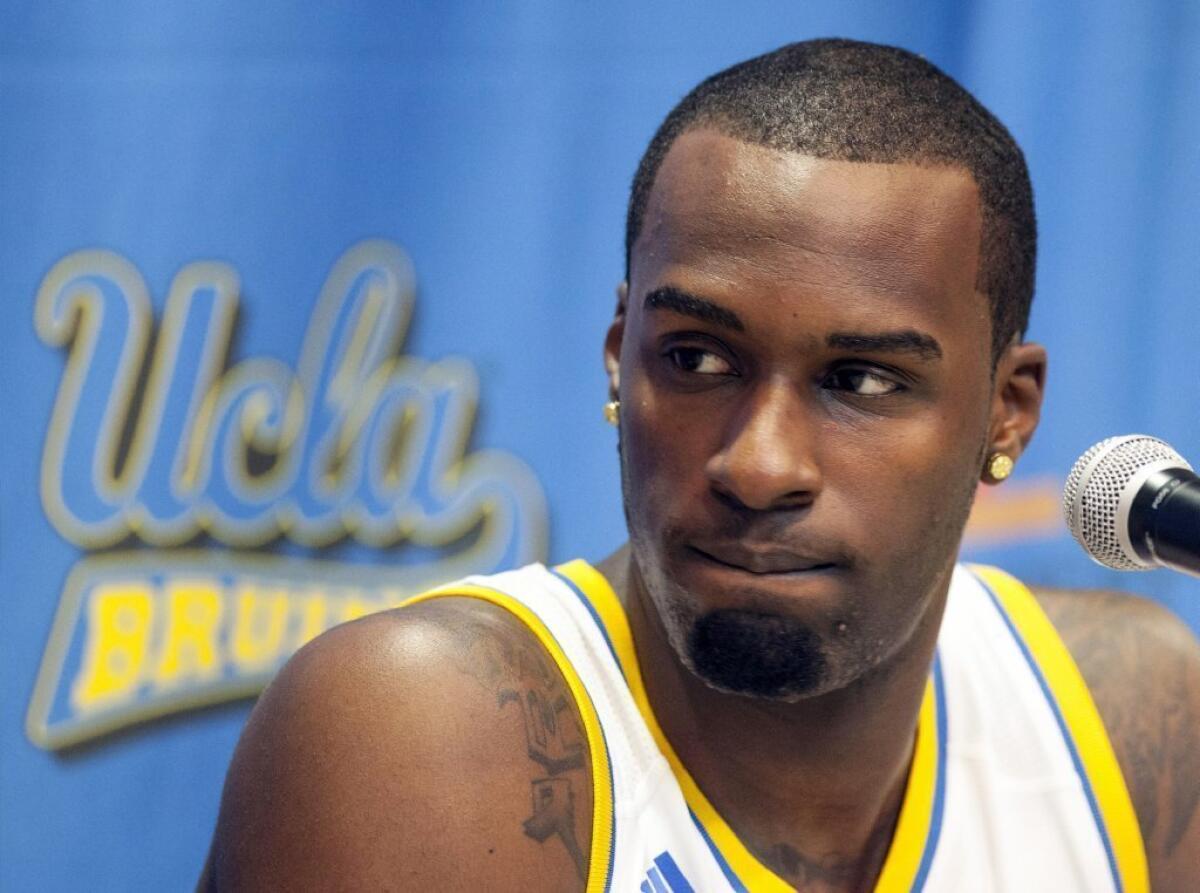UCLA’s Shabazz Muhammad declared ineligible by NCAA

- Share via
UCLA freshman guard Shabazz Muhammad has been declared ineligible by the NCAA after a lengthy probe uncovered a violation of NCAA amateurism rules.
It’s unknown how many games Muhammad will miss. UCLA Athletic Director Dan Guerrero said that figure is yet to be determined, but that UCLA will appeal the decision.
“I feel bad for the kid,” Guerrero said as UCLA prepared to open its season against Indiana State.
Muhammad’s case dragged on for about a year as the NCAA examined ties between two financial planners to his family and AAU team.
Investigators met with Muhammad’s parents -- Ron Holmes and Faye Muhammad -- in early November to discuss his case, people close to the situation said.
During those interviews, investigators raised questions about money Muhammad’s family had received from Benjamin Lincoln, who is based in Charlotte and is the brother of an assistant coach at Muhammad’s high school. Lincoln helped pay for unofficial visits to North Carolina and Duke, Muhammad’s family has said.
The NCAA also raised questions about Ken Kavanagh, who is based in New York and who partially funded the Dream Vision summer team that Muhammad played for in his hometown of Las Vegas.
Here is a statement from the NCAA:
“UCLA student-athlete Shabazz Muhammad is not eligible to compete in tonight’s game due to violations of NCAA amateurism rules. In addition to other pending issues, Muhammad accepted travel and lodging during three unofficial visits to two NCAA member schools.
The university and the NCAA enforcement staff agreed on the set of facts in the case, which led to the determination that a violation occurred. NCAA member schools have established standards to determine when an individual may provide financial assistance to student-athletes.
These criteria, which were not met in this case, are in place to identify when benefits are provided based on a student-athlete’s athletic ability.
The NCAA is committed to providing thorough, yet timely decisions regarding student-athlete eligibility. The expediency of these decisions can hinge on the level of timely cooperation of all involved parties.
In the case of Muhammad, the NCAA staff requested specific documents on July 31 to assist in the evaluation of Muhammad’s eligibility. However, the NCAA enforcement staff did not receive the majority of the requested documents for review until September 25, followed by more information on October 10, and additional critical information on November 1.
After reviewing thousands of pages of information, the NCAA interviewed Muhammad’s parents last week. The staff and the university then submitted the agreed-upon facts the afternoon of November 9. The NCAA then rendered a decision within a matter of hours. As demonstrated by the facts, we are committed to resolving the remaining matters as quickly as possible.”
In its own statement, UCLA said it was “extremely disappointed” in the NCAA’s determination.
“The University and our compliance staff have fully cooperated with the NCAA throughout this entire period, and we believe the decision is incorrect and unjust to Shabazz,” the UCLA statement said. “UCLA will expeditiously pursue its options to challenge this determination. When a final resolution has been reached by the NCAA, we will swiftly communicate the news to the entire Bruin family.”
ALSO:
Bruins face school with a John Wooden connection
Photos: A look inside of the newly renovated Pauley Pavilion
More to Read
Go beyond the scoreboard
Get the latest on L.A.'s teams in the daily Sports Report newsletter.
You may occasionally receive promotional content from the Los Angeles Times.










